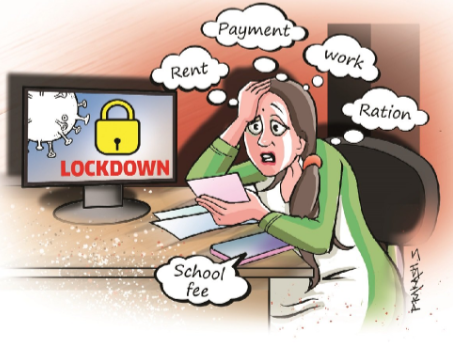FINANCIAL STRESS DUE TO COVID
The COVID-19 pandemic is first and foremost a health crisis. Many countries have (rightly) decided to close schools, colleges and universities. The crisis crystallises the dilemma policymakers are facing between closing schools (reducing contact and saving lives) and keeping them open (allowing workers to work and maintaining the economy). The severe short-term disruption is felt by many families around the world: home schooling is not only a massive shock to parents’ productivity, but also to children’s social life and learning. Teaching is moving online, on an untested and unprecedented scale. Student assessments are also moving online, with a lot of trial and error and uncertainty for everyone. Many assessments have simply been cancelled. Importantly, these interruptions will not just be a short-term issue, but can also have long-term consequences for the affected cohorts and are likely to increase inequality.
IMPACT ON EDUCATION:
Families Perhaps to the disappointment of some, children have not generally been sent home to play. The idea is that they continue their education at home, in the hope of not missing out too much.
So while global home schooling will surely produce some inspirational moments, some angry moments, some fun moments and some frustrated moments, it seems very unlikely that it will on average replace the learning lost from school. But the bigger point is this: there will likely be substantial disparities between families in the extent to which they can help their children learn. Key differences include the amount of time available to devote to teaching, the non-cognitive skills of the parents, resources (for example, not everyone will have the kit to access the best online material), and also the amount of knowledge – it’s hard to help your child learn something that you may not understand yourself. Consequently, this episode will lead to an increase in the inequality of human capital growth for the affected cohorts. Students will stay more anxious and academic stress would be increased . They would remain irritated and worried most of the times.
SOLUTIONS?
The global lockdown of education institutions is going to cause major (and likely unequal) interruption in students’ learning; disruptions in internal assessments; and the cancellation of public assessments for qualifications or their replacement by an inferior alternative.
What can be done to mitigate these negative impacts? Schools need resources to rebuild the loss in learning, once they open again. How these resources are used, and how to target the children who were especially hard hit, is an open question. Given the evidence of the importance of assessments for learning, schools should also consider postponing rather than skipping internal assessments. For new graduates, policies should support their entry to the labour market to avoid longer unemployment periods.
ANXIETY ISSUES:
All the people are facing this stressor. They are trying to cope with it.
1 to 7 years - Children of this age group goes to play school or are studying in lower classes . They has just started the way with the education, they are just learning basic things which would help them further. They are not getting any proper professional help of their teachers and cope with it by the teaching of their parents. They get bored and frustrated remaining at home through out the day. They dont get to play with their friends in fresh air.
08 to 17 years - These children are in middle or later stage of learning. They are trying to learn through online classes conducted by their school but the lack of resources or poor connection of internet their learning gets disturbed and they remain stresses and anxious about their studies. They are worried about the exams and results coming up.
18 to 24 years- They miss their college and they worry about their studies and exams. They also face problems related with lack of resources and internet connection. They are also coping up with this problem by studying at their own.
25 years and above- They are tensed about their jobs , their future and salary or business that how they would be able to to all the necessary expenses and the health of their children or elders.
But , I would say that, when you are not left with any option, you should just pray to god and remain positive and try to keep others positive aswell.
HOW TO STAY POSITIVE?
Students and their families should stay positive for eachother. They should try bring out the best with all they have using the easily available resources. Giving ones own hundred percent can make oneself feel positive, confident,happy, relaxed and calm.
Students can use their time in a more fruitful way by joining certain work from home internships,programs, watching academically based videos to gain knowledge which would help them in long run.


